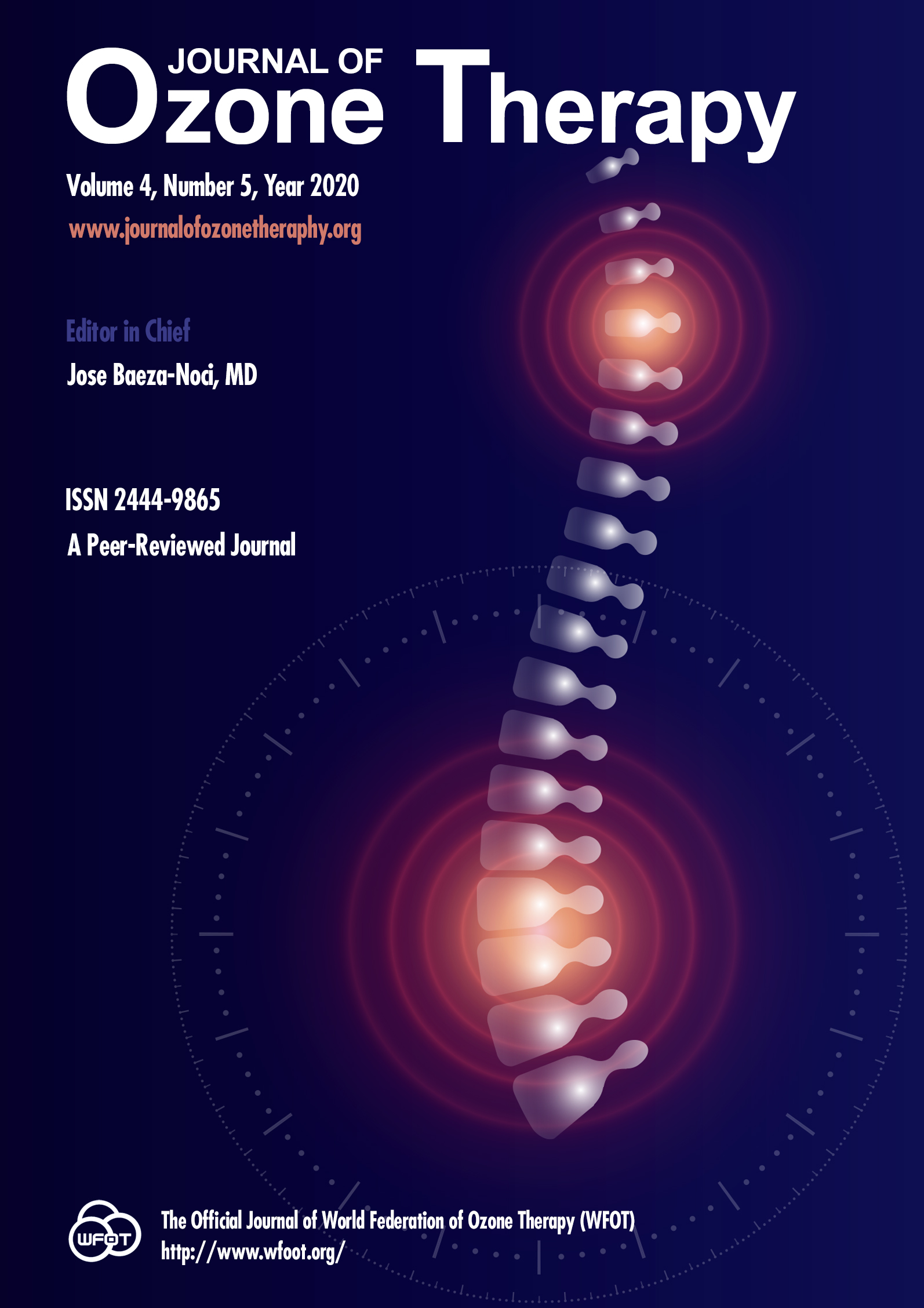Use of medical ozone in fail back surgery syndrome: a systematic review.
DOI :
https://doi.org/10.7203/jo3t.4.5.2020.19646Mots-clés :
ozone therapy, fail back surgery syndrome, FBSS Résumé
Résumé
The safety and efficacy of ozone injections in the spine for lumbar disc herniation has been proved in two systematic reviews with one metaanalysis. Many other papers with lower evidence level were published before encouraging its use for this pathology and other degenerative spinal diseases.
Fail back surgery syndrome (FBSS) is a terrible situation with no clear treatment option presently. Some authors have dared to use ozone injections in these patients, based on its antiinflammatory action and its highly save portfolio. Due to the great disability and dramatic situation of FBSS patients, a systematic review is mandatory in order to clarify the potential role of ozone in this pathology.
 Téléchargements
Téléchargements
 Références
Références
Merskey NB. Classification of chronic pain: descriptions of chronic pain syndromes and definitions of pain terms prepared by the International Association for the Study of Pain. 2nd ed. Seattle: IASP Press; 1994.
Hussain A, Erdek M. Interventional pain management for failed back surgery syndrome. Pain Pract. 2014; 14(1):64-78.
Martin BI, Mirza SK, Comstock BA, Gray DT, Kreuter W, Deyo RA. Are lumbar spine reoperation rates falling with greater use of fusion surgery and new surgical technology? Spine. 2007;32:2119-2126
Burton CV. Causes of failure of surgery on the lumbar spine: ten-year follow-up. Mt Sinai J Med. 1991;58(2):183-187.
Ragab A, Deshazo RD. Management of back pain in patients with previous back surgery. Am J Med. 2008; 121(4):272-278.
Trescot AM, Chopra P, Abdi S, Datta S, Schultz DM. Systematic review of effectiveness and complications of adhesiolysis in the management of chronic spinal pain: an update. Pain Physician. 2007; 10(1):129-146.
Patel VB, Wasserman R, Imani F. Interventional therapies for chronic low back pain: a focused (efficacy and outcomes). Anesthesiol Pain Med. 2015;5(4):e29716.
Valverde-Filho J, da Cunha Neto MBC, Fonoff ET, Meirelles ES, Teixeira MJ. Chronic spinal and oral morphine-induced neuroendocrine and metabolic changes in noncancer pain patients. Pain Med. 2015; 16(4):715-725.
North RB, Kidd D, Shipley J, Taylor RS. Spinal cord stimulation versus reoperation for failed back surgery syndrome: a cost effectiveness and cost utility analysis based on a randomized, controlled trial. Neurosurgery. 2007;61(2):361-368.
Baeza-Noci J, Cabo-Soler JR, Moraleda-Gomez M, Menendez-Cepero S, Re L. WFOT’s review on evidence based ozone therapy. World Federation of Ozone Therapy - WFOT. Bolonia: WFOT; 2015. Available from: https://www.wfoot.org/wp-content/uploads/2016/01/WFOT-OZONE-2015-ENG.pdf.
Steppan J, Meaders T, Muto M, Murphy KJ. A metaanalysis of the effectiveness and safety of ozone treatments for herniated lumbar discs. Journal of Vascular & Interventional Radiology. 2010;21(4):534-548.
Magalhaes FN, Dotta L, Sasse A, Teixera MJ, Fonoff ET. Ozone therapy as a treatment for low back pain secondary to herniated disc: a systematic review and meta-analysis of randomized controlled trials. Pain Physician. 2012;15(2):E115-129.
Muto M, Giurazza F, Silva RP, Guarnieri G. Rational approach, technique and selection criteria treating lumbar disk herniations by oxygen-ozone therapy. Interv Neuroradiol. 2016;22(6):736-740. DOI:10.1177/1591019916659266.
Barbosa DC, Angelos JSD, Macena GMJ, Magalhaes FNO, Fonoff ET. Effects of ozone on the pain and disability in patients with failed back surgery syndrome. Rev Assoc Med Bras (1992). 2017;63(4):355-360. DOI:10.1590/1806-9282.63.04.355.
Donato AD, Fontana C, Pinto R, Beltrutti D, Pinto G. The effectiveness of endoscopic epidurolysis in treatment of degenerative chronic low back pain: a prospective analysis and follow-up at 48 months. Acta Neurochir Suppl. 2011;108:67-73. DOI:10.1007/978-3-211-99370-5_11.
Ghatge S, Modi PD, Modi DB. Clinical and Radiological Improvement Following Ozone Disc Nucleolysis: A Case Report. Cureus. 2017;9(4):e1162. Published 2017 Apr 13. DOI:10.7759/cureus.1162.
Magalhaes FN, Soares SC, Torres JM, et al. Effects of ozone applied by spinal endoscopy in patients with chronic pain related to failed back surgery syndrome: a pilot study. Neuropsychiatr Dis Treat. 2013;9:1759-1766. DOI:10.2147/NDT.S48663.
Hernandez-Guinea BD, Hernandez-Santos JR, Tenopala-Villegas S, Canseco-Aguilar CP, Torres-Huerta JC. Efficacy of the application of epidural and paravertebral ozone at a concentration of 30 μg / ml for the management of chronic pain in patients with failed back surgery syndrome [Eficacia de la aplicación de ozono epidural y paravertebral a una concentración de 30 μg/ml para el manejo de dolor crónico en pacientes con síndrome de cirugía fallida de espalda]. Rev Soc Esp Dolor [Internet]. 2012 Feb [cited 2020 Nov 09];19(1):3-10. Available from: http://scielo.isciii.es/scielo.php?script=sci_arttext&pid=S1134-80462012000100002&lng=es.
Cánovas L, Castro M. Ozone therapy and fail back surgery syndrome [Ozonoterapia y síndrome de cirugía fallida de espalda]. Rev Soc Esp Dolor [Internet]. 2012 Feb [cited 2020 Nov 09];19(1): 1-2. Available from: http://scielo.isciii.es/scielo.php?script=sci_arttext&pid=S1134-80462012000100001&lng=es.
Alexandre A, Corò L, Paradiso R, et al. Treatment of symptomatic lumbar spinal degenerative pathologies by means of combined conservative biochemical treatments. Acta Neurochir Suppl. 2011;108:127-135. DOI:10.1007/978-3-211-99370-5_20.
Muto M, Andreula C, Leonardi M. Treatment of herniated lumbar disc by intradiscal and intraforaminal oxygen-ozone (O2-O3) injection. J Neuroradiol. 2004;31(3):183-189. DOI:10.1016/s0150-9861(04)96989-1.
Muto M, Ambrosanio G, Guarnieri G, et al. Low back pain and sciatica: treatment with intradiscal-intraforaminal O(2)-O (3) injection. Our experience. Radiol Med. 2008;113(5):695-706. DOI:10.1007/s11547-008-0302-5.
Scottish Intercollegiate Guidelines Network (SIGN). Checklists [Internet]. Edinburgh: SIGN; 2020. [cited 2020 Nov 09]. Available from: https://www.sign.ac.uk/what-we-do/methodology/checklists/
Téléchargements
Publié-e
Comment citer
-
Résumé578
-
PDF 663
Numéro
Rubrique
Licence
Journal of Ozone Therapy applies the Creative Commons Attribution-NonCommercial 4.0 International License (CC BY NC 4.0) license to works we publish.
Under this license, authors retain ownership of the copyright for their content, but allow anyone to download, reuse, reprint, modify, distribute and/or copy the content as long as the original authors and source are cited. No permission is required from the authors or the publishers.
You may not use the material for commercial purposes.
Appropriate attribution can be provided by simply citing the original article, provide a link to the license, and indicate if changes were made.
You may do so in any reasonable manner, but not in any way that suggests the licensor endorses you or your use.




